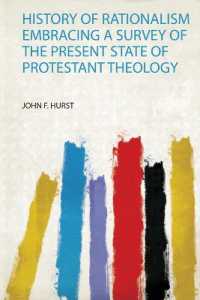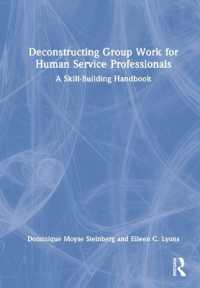- ホーム
- > 洋書
- > 英文書
- > Literary Criticism
Full Description
What is the soul of poetry? The most influential answer was probably given in Aristotle's Poetics, but even within that tradition which claimed the authority of Aristotle, the answers have differed widely. To Aristotle, the soul of poetry was one instance of mimesis, namely that construction of plot which he called mimesis of action, or muthos. However, in the Poetics alone, mimesis is used in several different meanings, and Aristotle does not distinguish clearly between them. The tremendous influence of his Poetics and the concept of mimesis may in fact be due to its elusiveness. Through tradition, it has been interpreted in many ways and translated into a number of terms, which do not always seem to have very much in common. This study is an attempt to clarify the Aristotelian tradition by demonstrating how interpretations of Aristotle's Poetics have vacillated between two particularly dominating instances of mimesis. The vocabulary may be the same, but the definition of the soul of poetry may differ substantially depending on which instance dominates. The study begins with an analysis of Aristotle's Poetics from a rhetorical point of view, as Aristotle developed his poetological categories inspired by those of rhetoric, and all interpretations of the Poetics up until the 18th century have been made from a rhetorical understanding of literature. Subsequent chapters then study exemplary reinterpretations of the soul of poetry within the Aristotelian tradition, beginning with Averroës, whose Arabic commentary was translated into Latin in the 13th century and for a long time was considered tantamount to Aristotle himself, receptions in the Italian Renaissance, French classicism and the influential launch of the "Fine Arts" by Charles Batteux in the 18th century, and his German counterparts. Three concluding chapters apply the perspective on issues concerning the aesthetics of the sublime, the symbol, and the role of emotions in the system of genres.
Contents
Preface; Introduction; Culture: The Under devalued Dimension of Global Security; Transit through Terror: The Architecture of International Mobility after 9/11; Neo-tribalism: Exploring the Populist Backlash to Europeanism; Rural-Urban Migration: Seeds of Strife in the People's Republic of China; Laiklik: Secularism in Turkey: Not Just a Means for State to Control Religion, but an Endless Source of Social Conflict; Complexity & Art of Acting Politically: State, Security & Subject Formulation of Global Life; Imperialism & Its Aftermath in Present Day Africa: How the Failure to Acknowledge & Remedy Colonial Vestiges Continues to Fuel Unrest; The role of Prime Ministers in Australian foreign policy: A Case Study on Japan; Indonesian Foreign Policy: Regional & Domestic Considerations; Return to Basics? Japan's security concept after 9/11.








